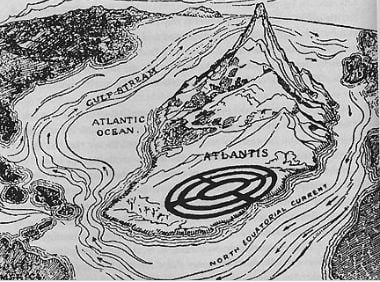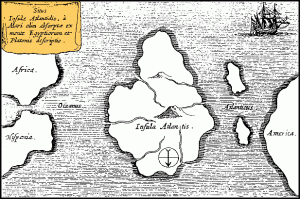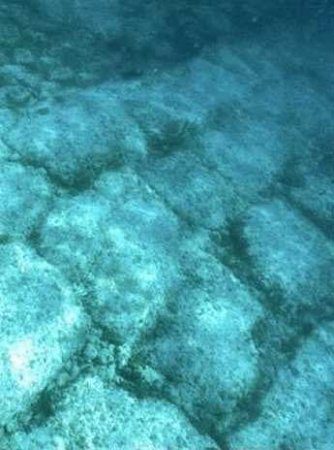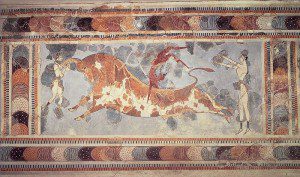 When presenting my workshop on the origins of The Tarot I like to start the presentation with an extended monologue of bulls*#t. “Many books won’t tell you this, but Tarot was first used in Atlantis . . . . ” is typical of how I begin and at that moment it’s pretty easy to gauge the temperature of the room. About half the people in the audience seem to hang on every word, while the other half begin to roll their eyes and make gestures to their buddies about making their way to the door. Continuing the soliloquy I lament on the destruction of ancient Atlantis and how that triggered the dissemination of Tarot. ” . . . . earthquakes, volcanoes, the power of the Earth erupted and proceeded to swallow the great empire whole, but there were refugees who escaped the destruction and shared their wisdom with the world. Many of those who escaped made their way to Egypt where they rebuilt Atlantis in the pyramids and made the first Tarot cards on papyrus, eventually passing on their secrets to the Gypsies . . . .” As I said at the start that’s all complete crap, but I love seeing the reactions.
When presenting my workshop on the origins of The Tarot I like to start the presentation with an extended monologue of bulls*#t. “Many books won’t tell you this, but Tarot was first used in Atlantis . . . . ” is typical of how I begin and at that moment it’s pretty easy to gauge the temperature of the room. About half the people in the audience seem to hang on every word, while the other half begin to roll their eyes and make gestures to their buddies about making their way to the door. Continuing the soliloquy I lament on the destruction of ancient Atlantis and how that triggered the dissemination of Tarot. ” . . . . earthquakes, volcanoes, the power of the Earth erupted and proceeded to swallow the great empire whole, but there were refugees who escaped the destruction and shared their wisdom with the world. Many of those who escaped made their way to Egypt where they rebuilt Atlantis in the pyramids and made the first Tarot cards on papyrus, eventually passing on their secrets to the Gypsies . . . .” As I said at the start that’s all complete crap, but I love seeing the reactions.
Back when I was in elementary school I’ll admit to being completely charmed by the idea of Ancient Atlantis. It came up not just in comic-books but in all of the occult books I checked out of the library. If I was going to believe in Bigfoot, aliens at Roswell, and werewolves I felt obligated to believe in Atlantis. As I got older I grew away from Atlantis. This process was helped immensely by the often crazy and ludicrous “Searching For Atlantis” type programs that were a staple of cable channels with “History” and “Learning” in their names throughout the 90’s and early 00’s. Instead of placing Atlantis in the Atlantic Ocean or Mediterranean Sea these shows placed Atlantis all over the globe. Brazil, Antarctica, Florida . . . . It all just felt so far out of left-field that it caused me to begin dismissing Atlantis all together.
When writing about the educational differences between Aleister Crowley and Dion Fortune in Triumph of the Moon Ronald Hutton mentions Atlantis:
“A distinction between the two great magicians lay in their education. Crowley had a full and traditional one, including public school and Cambridge, and supplemented this with very extensive travels, especially in Asia. Fortune (like most women of her time) never went to university, and seems to have had no interest in traveling other than that of the mind. As a result, Crowley’s experience of magic and mysticism was brushed onto his large knowledge of conventional history, geography, and literature, while Fortune’s grasp of these subjects was absorbed largely through her occult studies. One striking result of this that he never had any time for the myth of Atlantis, while a belief in its literal truth became a central prop of her world view.” (emphasis Mankey)
 That last sentence is nearly burned into my memory because I still see a lot of divisions in the greater occult community over the subject of Atlantis. I’ll happily admit to being far more Crowleyian in my opinion about Atlantis, I’m far more likely to think of it as the home of Aquaman than as a repository of ancient wisdom. Despite my own misgivings, when an occultist of Dion Fortune’s stature claims to have been visited by visions of Atlantis by the time she was four years old it becomes impossible to dismiss completely out of hand.
That last sentence is nearly burned into my memory because I still see a lot of divisions in the greater occult community over the subject of Atlantis. I’ll happily admit to being far more Crowleyian in my opinion about Atlantis, I’m far more likely to think of it as the home of Aquaman than as a repository of ancient wisdom. Despite my own misgivings, when an occultist of Dion Fortune’s stature claims to have been visited by visions of Atlantis by the time she was four years old it becomes impossible to dismiss completely out of hand.
In Madame Blavatsky’s Theosophy Atlantis is a central myth, and she provides a great deal of background information on the island nation. Atlantis shows up in her magnum opus Isis Unveiled, and there are many in Theosophy who credit Blavatsky with making Atlantis mainstream. Atlantis was also central to the prophecies of American psychic Edgar Cayce and it remains important to many of his modern day followers. The magazine Atlantis Rising takes its name from the lost continent, as does The Atlantis Bookstore, one of the oldest occult stores in London.
 Strangely, Atlantis doesn’t come up very often among Modern Pagans. I’ve had people tell me that “the mysteries of Wicca” are hidden inside Egypt’s Great Sphinx, but nothing that ridiculous has ever come up in regards to Plato’s sunken continent. About the only time I hear Atlantis mentioned at Pagan gatherings is when people reminisce about their past lives or Akashic Records. (If Atlantis was real I’m starting to think it sank into the ocean because everyone who lived there was either a member of the nobility or some sort of sorcerer-clergy. No one who was Atlantean in a past life seems to have ever been a farmer or a tradesman.) I’m not obsessed with Atlantis by any means, but I love mysteries and myths, and Atlantis is certainly both of those.
Strangely, Atlantis doesn’t come up very often among Modern Pagans. I’ve had people tell me that “the mysteries of Wicca” are hidden inside Egypt’s Great Sphinx, but nothing that ridiculous has ever come up in regards to Plato’s sunken continent. About the only time I hear Atlantis mentioned at Pagan gatherings is when people reminisce about their past lives or Akashic Records. (If Atlantis was real I’m starting to think it sank into the ocean because everyone who lived there was either a member of the nobility or some sort of sorcerer-clergy. No one who was Atlantean in a past life seems to have ever been a farmer or a tradesman.) I’m not obsessed with Atlantis by any means, but I love mysteries and myths, and Atlantis is certainly both of those.
If the most sober-minded of historians are to be believed Atlantis was never a real place. Stories of Atlantis don’t come from deep within ancient mythology, they come from the philosopher Plato writing in the year 360 BCE and are found in the Dialogues of Timaeus and Critias (for those unfamiliar with “dialogues” a dialogue is simply a written conversation). Plato often wrote of idealized society (most famously in The Republic) and in the dialogues of Timaeus and Critias he uses both Atlantis and Athens as examples of perfection and corruption. In Critias he wrote of the greatness of Atlantis and the eventual reason for its downfall:
“For many generations, as long as the divine nature lasted in them, they were obedient to the laws, and well-affectioned towards the god, whose seed they were; for they possessed true and in every way great spirits, uniting gentleness with wisdom in the various chances of life, and in their intercourse with one another. They despised everything but virtue, caring little for their present state of life, and thinking lightly of the possession of gold and other property, which seemed only a burden to them; neither were they intoxicated by luxury; nor did wealth deprive them of their self-control; but they were sober, and saw clearly that all these goods are increased by virtue and friendship with one another, whereas by too great regard and respect for them, they are lost and friendship with them. By such reflections and by the continuance in them of a divine nature, the qualities which we have described grew and increased among them; but when the divine portion began to fade away, and became diluted too often and too much with the mortal admixture, and the human nature got the upper hand, they then, being unable to bear their fortune, behaved unseemly, and to him who had an eye to see grew visibly debased, for they were losing the fairest of their precious gifts; but to those who had no eye to see the true happiness, they appeared glorious and blessed at the very time when they were full of avarice and unrighteous power.”
Eventually Zeus destroys Atlantis, or so we have to assume when it comes to Critias, the end of the dialogue has been lost.
The most famous passage describing Atlantis comes from Timaeus and even includes a vague description of where Atlantis was situated before sinking into the sea:
“This great island lay over against the Pillars of Heracles, in extent greater than Libya and Asia put together, and was the passage to other islands and to a great ocean of which the Mediterranean sea was only the harbor; and within the Pillars the empire of Atlantis reached in Europe to Tyrrhenia and in Libya to Egypt. This mighty power was arrayed against Egypt and Hellas and all the countries bordering on the Mediterranean. Then your city did bravely, and won renown over the whole earth. For at the peril of her own existence, and when the other Hellenes had deserted her, she repelled the invader, and of her own accord gave liberty to all the nations within the Pillars. A little while afterwards there were great earthquakes and floods, and your warrior race all sank into the earth; and the great island of Atlantis also disappeared in the sea. This is the explanation of the shallows which are found in that part of the Atlantic ocean.”
Did you catch just how big Atlantis was according to Plato? Larger than Libya and Asia put together! That’s a pretty big chunk of land to just sink into the sea over the course of a day. Critias contains a passage where Plato places the date of his Atlantis/Athens encounter 9000 years in the past, long before Athens even existed. Timaeus is a strange mixture of ancient science, myth, and philosophy, and for that reason along with the strange dating and exaggerated size of the place it’s thought by many that Atlantis is meant to be more metaphor than historical truth. It seems to me that if you are going to trust in Plato’s account of its destruction than you have to trust in his account of its creation, an account which involves the gods splitting up Plato’s world and Poseidon impregnating mortal women.
 Despite the skepticism of many (including myself) there are lots of people who hold onto the myth of Plato’s Atlantis and take his account as a real historical event. The result is a fascinating pastiche of discovery and conjecture all centered around the idea of Atlantis. Offshore near the Bahamas there’s the Bimini Road, a series of natural rock formations that look very much like a humna-made road. American psychic Edgar Cayce predicted that Atlantis would emerge from the Atlantic Ocean in the late 1960’s, the same time the Bimini Road was discovered. To many it was (and still is) proof of an Atlantean civilization.
Despite the skepticism of many (including myself) there are lots of people who hold onto the myth of Plato’s Atlantis and take his account as a real historical event. The result is a fascinating pastiche of discovery and conjecture all centered around the idea of Atlantis. Offshore near the Bahamas there’s the Bimini Road, a series of natural rock formations that look very much like a humna-made road. American psychic Edgar Cayce predicted that Atlantis would emerge from the Atlantic Ocean in the late 1960’s, the same time the Bimini Road was discovered. To many it was (and still is) proof of an Atlantean civilization.
My favorite theory of Atlantis involves the Minoan Civilization which began on the island of Crete, and if Atlantis is real it makes the most sense. The Minoans were a seemingly prosperous people and had a thriving culture. Many of my favorite “Ancient Greek” paintings come from the Palace of Knossos on Crete (as does the “Minoan Snake Goddess” many of us own a statue of). While we don’t know a whole lot about Minoan Civilization beyond what archeology can tell us (“Linear A” the written language used by the Minoans has not yet been translated), what artifacts remain do hint at a broad amount of gender equality. Women were a part of most athletic contests and competed side by side with males. The Minoans had even figured out how to get running water into their palaces, all of this around the year 1700 BCE. They were also good sailors, and Minoan artifacts have been found on both the mainland of Greece and in Egypt.
 Minoan Civilization declined abruptly (thought not in a day like Plato’s Atlantis), with one of the reasons perhaps being the eruption of a volcano. The eruption at nearby Santorini (also known as Thera) somewhere between 1645–1600 BCE was one of the most violent in human history and sunk much of the island into the sea. The eruption most likely resulted in tsunamis and large amounts of ash being thrown into the sky. All of this most likely played a major role in the decline of Minoan Civilization, though the true end would come a few centuries later. Could Thera and the Minoans be Plato’s Atlantis? If Atlantis was a real place Minoan Civilization is the most likely candidate. (I also want to add that the civilization of the Minoans was so fascinating that it doesn’t need the added cache of being Atlantis.)
Minoan Civilization declined abruptly (thought not in a day like Plato’s Atlantis), with one of the reasons perhaps being the eruption of a volcano. The eruption at nearby Santorini (also known as Thera) somewhere between 1645–1600 BCE was one of the most violent in human history and sunk much of the island into the sea. The eruption most likely resulted in tsunamis and large amounts of ash being thrown into the sky. All of this most likely played a major role in the decline of Minoan Civilization, though the true end would come a few centuries later. Could Thera and the Minoans be Plato’s Atlantis? If Atlantis was a real place Minoan Civilization is the most likely candidate. (I also want to add that the civilization of the Minoans was so fascinating that it doesn’t need the added cache of being Atlantis.)
Interest in Atlantis has risen and sunk (sort of like the alleged continent) across the centuries. While I’m not a believer in the literal truth of the place, I treasure the myth. I like the idea of a mid-Atlantic utopia devoted to the gods, and even if it never existed, it still gives us something to aspire too. My wife often mocks me for believing in things like Bigfoot, and she’s probably right, but my response to her is usually “the world is more interesting if there’s a Bigfoot in it.” Atlantis is much the same way, our world is far more interesting when we are searching for and referencing ancient Atlantis.
As the singer Donovan would say “Hail Atlantis!”

















